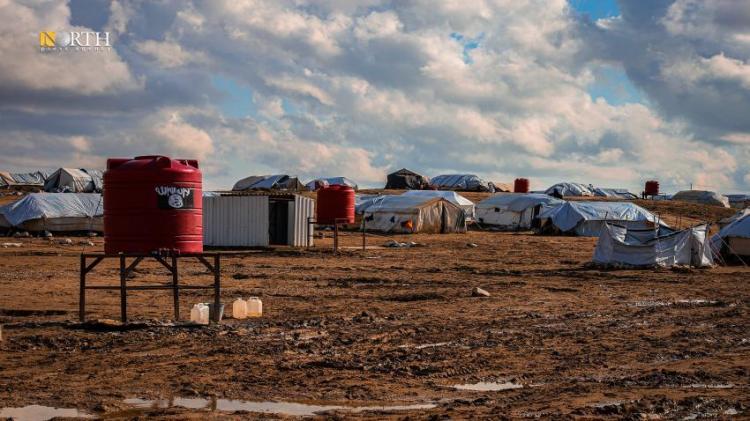Hasakah- North-Press Agency
Roj Mousa – Mohammad Habash
Documents recently obtained by North-Press, have revealed the arrival of money orders from Idlib areas, in north-west of Syria, to al-Hawl camp, in the far north-eastern Syria, which include about 70 thousand people, including 12 thousand of foreign Islamic State group (ISIS) families.

The documents show the arrival of varying amounts of money from the areas controlled by the Turkish-backed armed opposition groups in Idlib to the foreign ISIS families in the camp, in addition to payments that reached these families from different countries.
The extremist group’s women in the camp got the money through two money transfer offices, which were established by the camp administration earlier, to "run the financial affairs of the camp's residents."
One of the pages of the remittance receipt records shows that two remittances arrived from the city of Idlib on the 17th of February, at an amount of $485, received by two women, while the next day another two payments arrived for one of the camp's women at an amount of $486 from Idlib city and the town of Sarmada. While another woman received an amount of $1,090 from the city of Idlib on the 22nd of this month.

One of the employees working in the remittances office, said that they receive dozens of remittances on a daily basis, while the total monthly amounts received by the families of the terrorist group is up to 15-20 thousand dollars, coming from the city of Idlib and the areas of Sarmada and Harem in its northern countryside, and more than 40 foreign countries.
Ali (pseudonym), who is an employee in one of the two offices for remittance, said that sixty percent of the total sums come from Turkey, accompanied by fake United States phone numbers.
The camp administration follows strict policies regarding the incoming funds to the families, and does not allow the receipt of money payments that exceed more than 300 dollars at once, and keep the excess amount to return it to the families as monthly payments.

The camp administration says that these measures fall within the framework of limiting attempts to smuggle families out of the camp, which are carried out by organized smuggling networks.
Many of ISIS detainees held by the Syrian Democratic Forces (SDF), have tried to escape from detention centers and camps, during the time of the Turkish offensive along with its affiliated armed opposition groups, on the areas of Ras al-Ain (Sere-Kaniye and Tal Abyad (Gre-Spi).
According to what the Autonomous Administration stated at that time, some of ISIS militants managed to escape, taking advantage of the Syrian Democratic Forces' preoccupation of repelling the Turkish army's offensive on the region, as cases of escaping of ISIS families from Ein Issa camp in Raqqa countryside were recorded, by the approach of battles into the camp.
On October 19, 2019, the Internal Security Forces (Asayish) managed to thwart a mass escape of 14 women and 21 children of ISIS families from al-Hawl camp towards the areas of Deir ez-Zor eastern countryside and the Iraqi borders, according to the camp's administration.
While on December 8, the Asayish forces thwarted an attempted escape operation by six women of Russian and Kazakh nationalities through a smuggling network that reached Jarablus and al-Bab areas, in northern Aleppo, which are held by the Turkish-backed armed opposition groups (Euphrates Shield).
On the other hand, the incidents of killing have increased in al-Hawl camp during the previous months, and have reached nearly six cases so far, the last of which was in January, when an Iraqi and a Turkish women were killed in two consecutive days, preceded by another killing incident of an Iraqi man and his wife in the same month.
The detention centers of the Islamic State terrorist group (ISIS), which are administrated by the Syrian Democratic Forces, in addition to thousands of their families in al-Hawl camp in east of Hasakah, and Roj camp in Derik countryside in north-eastern Syria, constitute a dangerous human gathering and a “time bomb”, in light of the absence of solutions, as their countries neither accept taking them back, nor they support the establishment of an international tribunal in the areas of the Autonomous Administration of North and East of Syria.

The Commander-in-Chief of the Syrian Democratic Forces, General Mazloum Abdi, said in a previous statement, that the international support is basic means to solve the issue of "ISIS" detainees, nevertheless, there hasn't been enough support so far. "Some countries have officially told us that they do not want to bring their citizens back to their countries again, they should stay in your areas," Abdi added.
He explained that the problem is some countries deal with the issue "as a security problem that they solve secretly and illegally, until we responded to them and found that they were not serious, as this does not solve the problem. That's why we consider it as a political issue, indeed," General Abdi added.
Most countries express their fears if ISIS militants leave the detention centers, and at the same time, most of them refuse to accept their ISIS citizens.

